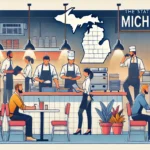The Michigan Liquor Control Commission (MLCC) may issue new on-premises redevelopment licenses or development licenses. Section 436.1521a of the Michigan Liquor Control Code, Public Act 58 of 1998 includes such rules and criteria surrounding this on-premises license. Such licenses may be issued to improve communities and the lives of those in such redeveloped cities, in addition to the quota licenses in counties and cities. These on-site licenses may be a beneficial way of increasing attraction for visitors within these redeveloped or developed cities. Often, there is a lack of on-premises licenses available due to the high demand. These licenses can be used for bars, restaurants, clubs, hotels, etc. Despite the quota licenses in counties, there are townships, villages, and cities that may allow such redevelopment and development licenses for their communities. This can be an effective way of obtaining a license, especially if there are no available licenses within the quotas. It is worth noting that such redevelopment and development licenses may exist within cities.
Section 436.1521a of the Michigan Liquor Control Code includes the eligibility criteria for these redevelopment licenses and development licenses. A business may be qualified if it is in a redevelopment district and the type of business activities includes entertainment, dining, or recreation, along with meeting the criteria in the Michigan Liquor Control Code. Another way a business may be eligible is if it is in a development district (authority district, development area, downtown district, principal shopping district), along with meeting the criteria in the Michigan Liquor Control Code. There are also other criteria in the code that show each qualification for either a redevelopment district or a development district. Some of these criteria may include seating capacity, investment in property, capital investments, type of activities, etc. Applicants need to qualify for such a license, based on the applicable liquor codes in place. It is important to be aware if your business may qualify for such a development or redevelopment license, especially if the owner is not able to locate a quote license. This may be a positive opportunity for those in need of a liquor license. The Michigan Economic Development Corporation outlines and details the requirements a business must meet to be approved for a redevelopment license in this guide.
Application Process for A Redevelopment License
An application with the liquor control commission is to be completed on behalf of the applicant. Applicants will need to submit a retail license and permit application form and license questionnaire form. The applicant would need to specify if they are applying for a redevelopment license or development district license and whether such a license is for either Class C, B-Hotel, Tavern, or A-Hotel. The application will include additional criteria needed for redevelopment license or development district license. Also, there are required documents that need to be submitted with the application. Some of these documents include a resolution from the local government unit establishing the redevelopment project area or development district, map of development district or redevelopment project area, and affidavit from assessor. The application also includes the applicant’s name and address to be licensed. Local governmental unit approval is also assessed within the application criteria. There are other requirements that the applicant should comply with, per liquor codes, the liquor commission, and other state and local laws.
Benefits to the Community
Additionally, these development and redevelopment licenses can be an important way of furthering cities in Michigan. The hospitality industry is important to many cities and townships. Specifically, in applying for both these licenses, a requirement includes that the applicant is involved in such activities of entertainment, dining, or recreation. This is crucial to cities for development purposes, as it may increase the attraction and tourism to the city or township in question. Many establishments including hotels, restaurants, and clubs are beneficial to cities and townships, as they can promote new developments to the community. A recent study reported by Lodging Magazine suggests that 9 out of 10 Mayors believe their communities would benefit from having additional lodging accommodations. Especially, as new development and redevelopment will offer locals employment opportunities. Many people enjoy visiting new restaurants and being entertained, offering new establishments within the community is exciting for locals and tourists. The hospitality industry is expanding, and many new establishments are being created all over Michigan. Restaurants and hotels can be an important aspect of a city’s economic value and how they contribute to cities and townships in an advantageous way. Local restaurants and other types of businesses can make a positive impact in communities, due to the resources. Paying local employees can be an effective way of helping cities and communities, due to local hiring.
Potential Outcomes of Redevelopment License
Further, the redevelopment and development licenses may allow one to further these visions, as it relates to their establishment. This may include developing their business to their liking and participating in rehabilitating the community. Specifically, one of the requirements for obtaining these licenses includes specific investment. This may allow business owners to spend a certain amount on a business that could be favorable to the community and potentially a unique location for patrons. Despite there being quota licenses in my counties, such licenses are useful to applicants who plan to invest in rebuilding buildings or creating new buildings. This can allow the owner to redevelop buildings in the community and improve them for the better. Similarly, owners may construct new buildings, which are positive additions to the community. It is important to follow the criteria listed in Michigan liquor codes to see if you qualify for a redevelopment license or development license.
The hospitality industry is an important part of the United States economy, especially as it relates to cities and townships. New business owners who take part in redevelopment or development licenses may contribute to the community by their revitalized vision for the community and the desire to entertain individuals. This may relate to establishments such as nightclubs, restaurants, bars, and other recreational activities. Providing activities that are enjoyable for tourists and local individuals. Many people enjoy consuming alcoholic beverages and eating a variety of cuisines. It is important to make guests feel comfortable within these establishments, as repeat business is essential for success in the hospitality industry. A liquor license being provided at your establishment will only increase the potential profit margins. The National Restaurant Association estimates that Michigan will see an employment growth rate of roughly 16% by 2030.
How an Attorney Can Help
Attorneys may be a resourceful tool to help with obtaining a redevelopment or development license. They can assist with the application process, along with understanding the criteria per each city’s regulations and codes. Attorneys may assist with possible complex issues that an applicant may face within the application process. It is important to follow state and local laws, especially as it relates to liquor codes. Applicants should be aware of all the rules, as it relates to obtaining a liquor license and the responsibility of being a license holder. A comprehensive understanding of the requirements can be resourceful when assessing each application. Legal counsel can be a good way of helping with options that are relevant to your business.
In conclusion, redevelopment licenses and development licenses can be a good way of obtaining a liquor license, especially when there are not any available quota licenses in your city or desired location. It is important to understand the qualifications, along with Michigan Liquor License codes. Maximizing your chances of receiving such licenses should be a priority, especially as it relates to new businesses. Such redevelopment and development licenses may affect hospitality in a positive way for business owners and the community. These licenses can be a influential impact to communities, especially those cities who need redevelopment. Schedule a consultation with our firm today to see if a redevelopment license or development license is applicable for your new business venture.





